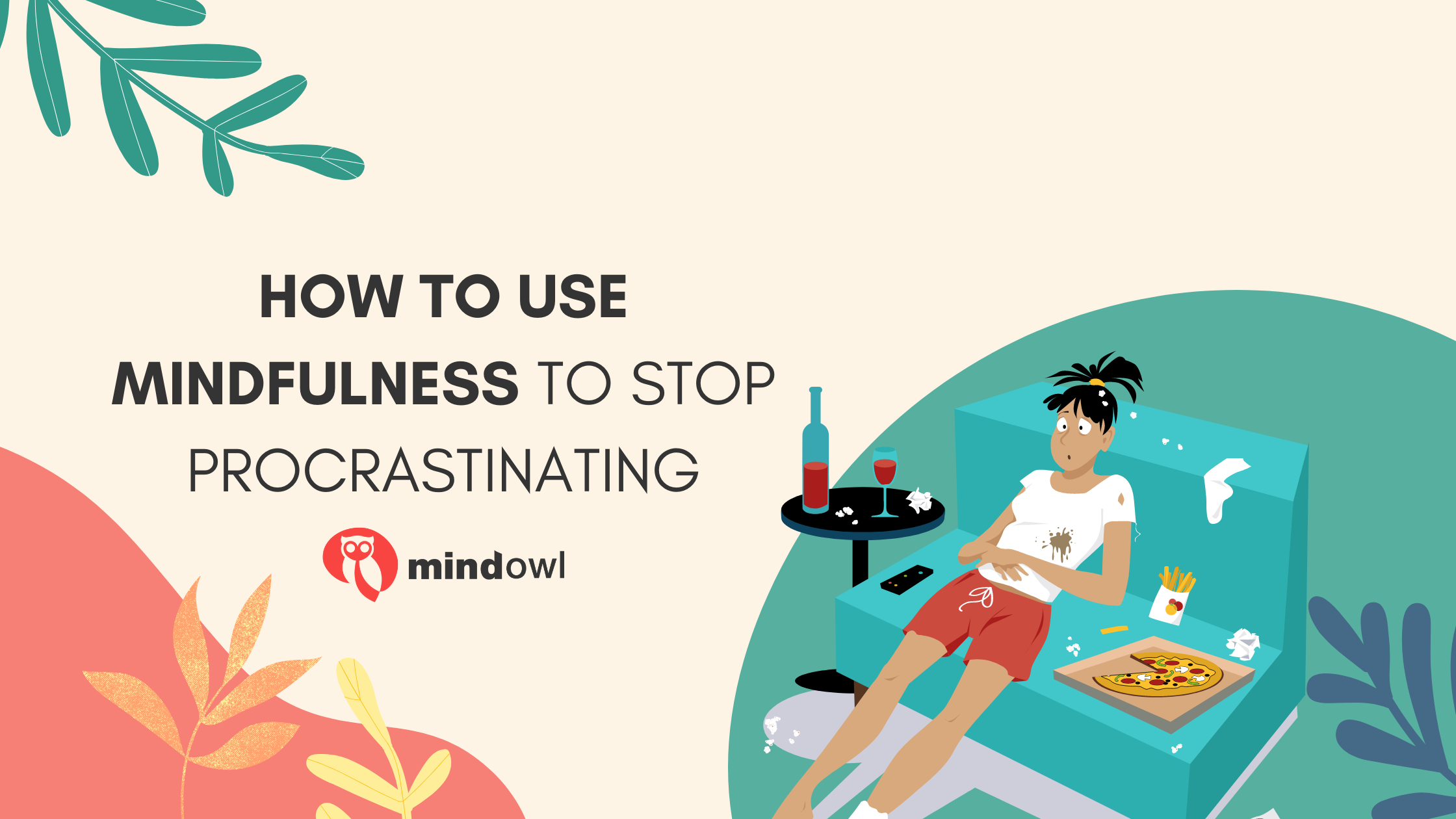Can we use mindfulness to stop procrastinating?
Have you had the same few things on your ‘to-do’ list for weeks, with your inbox piling up and the mountain of work you’ve meant to get started on continually growing? Whether its avoiding difficult personal conversations, delaying work tasks or struggling with academic procrastination, just remember you’re not alone in this. Today’s article on procrastination and mindfulness will give you the tools you need to become a more organised, efficient, and self-aware individual.
Not only does procrastination worsen stress and anxiety, it also leads to greater dissatisfaction and unhappiness with life in general. High levels of procrastination can be caused by a lack of motivation, yet they also feed these feelings of demotivation. This vicious cycle of avoiding things which seem like too much of a burden only worsens the negative emotions and general mental load we’re suffering under, while increasing the sense of time pressure associated with each daunting task. Rather than starting to complete an important task, we fill our time with trivial, meaningless and often time-wasting substitutes. While it may feel like we are doing ‘something’, we would perhaps have been better off not doing anything at all. Worries that we aren’t doing ‘enough’ sink in, yet at the same time we feel too overwhelmed to get stuck into the task at hand. So why do we so often fall into this procrastination trap? Answering this requires a look at the relationship between procrastination and mindfulness; because often, we’re too caught up in our own minds to be able to think clearly and rationally.
Social media and procrastination
The rise of social media means that many people now feel it is normal to pick up their phone over 100 times a day, spending an average of three and a half to four hours a day scrolling. This is one of the biggest distractions we face, particularly because we cannot predict what we will see on social media or whether it may upset us, bother us or affect our ability to concentrate for the rest of the day. In recent years, scientists have identified clear causal links between the amount of time spent on social media and the way we feel about ourselves, our lives and the lives of others. The common phrase ‘comparison is the thief of joy’ holds true; studies show that there is a strong positive correlation between anxiety and depression and time spent on social media. Limiting the time you spend on your phone can improve your mental health, while also practically freeing up your time and therefore helping with the problem of procrastination. Being mindful of how and where we spend our time during the day is the first step to understanding how we can beat procrastination and be more productive on a day-to-day basis.
Why do we procrastinate?
Some psychologists argue that while procrastination often feels like it comes from the subconscious, people can often actually seek out distractions. If you think about it, it’s perfectly natural that humans avoid tasks that feel daunting or difficult, in favour of more accomplishable or comforting activities. Tackling this tendency is where the important role of mindfulness comes into play – being more mindful of how our minds work can make us better equipped to face these challenges.
There are some common misconceptions about procrastinators, one of which is that they are just lazy. However, it’s actually been suggested by procrastination researchers that a large proportion of so-called procrastinators are actually in fact perfectionists, people who often feel it is better to not do something at all than to do it imperfectly. This can cause things to be pushed away and delayed rather than being dealt with at an early stage. And as this work piles up and we increasingly leave things to the last minute, our anxiety and stress levels will inevitably worsen. From here, it is easy to fall into a downward spiral of feeling behind, worrying about the future, and then pushing problems away again rather than taking steps to tackle them.
But what about those of us who feel as though we procrastinate and delay things that we enjoy? Why is this? Psychologists argue that this largely relies on emotion regulation. When we have poor self-regulation, we go into task avoidance mode whenever we feel any kind of negative emotional response to a task. When combined with perfectionism, this can cause seriously high procrastination levels. Thankfully, the association between mindfulness and procrastination (which we identified earlier on) can provide solutions; the practice of mindfulness can have a huge impact on helping us break away from negative emotions and thought patterns before the avoidance cycle kicks in.

Mindfulness for procrastination
The relationship between mindfulness and procrastination is simple; becoming more aware of the present moment can help us notice and deal with boredom, pessimism and other negative experiences as they happen. Just acknowledging the prevalence of procrastination in our lives goes some way towards lessening its hold on us. Recognizing that our thoughts or feelings about something are simply an automatic response allows us to choose to respond in a more rational, objective way. If we make efforts to alter our habitual responses to problems and try to tackle them head-on, we will make far better progress than if we avoid them. For more on this subject, check out our article on the Stoic philosophy of ‘The Obstacle is the Way’. It might seem difficult to fight the urge to get ‘hooked’ by emotions, but ultimately there are many things we can do to enhance our skills of emotional regulation and build our understanding of why we are feeling a certain way.
Acceptance and compassion are two of the most important elements of this process. Perfectionists are often extremely critical in their views, as they have high standards that they like to adhere to. Unfortunately, this can cause them to become overly pessimistic and closed off if their inner critic is not acknowledged and rationalised from time to time. Mindfulness is a simple place to start when trying to strengthen this sense of self-awareness. While it may seem difficult at first, a dedicated two or three minutes of regular mindfulness meditation practice can have an impressive impact. For more on how to start developing a positive mindful daily routine, check out our article on the effects of mindfulness meditation here.
Accepting negative feelings
Harnessing the relationship between mindfulness and procrastination in a positive way means accepting what you are feeling in the present moment. Pushing feelings away is normal because no one wants to suffer negative emotions; however, each difficult personal experience is also a necessary part of life that can allow you to grow as an individual. Staying in your comfort zone can stop you from flourishing; to improve and move forwards, we must accept that feeling uncomfortable is okay. If we feel negative feelings, accept them, and try to move through them, our long-term well-being will be far better than if we simply continue running away from them because at some point they’re bound to catch up with us. Practising acceptance in procrastination and dealing with feelings in the present moment can make them more manageable and less likely to affect our levels of self-esteem and self-worth. After all, tackling a problem head-on can show us how strong we really are – this is a great example of the important role of mindfulness in our day-to-day lives.
Often, we underestimate ourselves. Just think about a time when you felt you absolutely could not do something; maybe it was a presentation, an exam, or another impending event that made you want to just run away. After we’ve completed these ominous tasks, we often look back and laugh at ourselves, wondering why we were so dramatic and thinking about how simple the task actually was. We may even feel a slight sense of joy or even euphoria upon achieving something we had been so worried about. Procrastination and all the negative feelings that go with it can be associated with the most menial tasks or the toughest challenges. The point is, we must learn how to practise acceptance in relation to those tasks – we may not always feel great about them, to begin with, but it’s always better to start than to not try at all.
The mindful way forward
Embracing mindfulness practices may seem simple, but in order to achieve maximum benefits, being mindful takes a conscious and dedicated effort. When it comes to dealing with the associations between mindfulness and procrastination, this is particularly true. Tackling procrastination requires a high level of honesty and self-awareness, which can be challenging. However, it’s important to remember that being mindful of our feelings in the present moment can help us to understand our reactions to events in the future. This is how we use the link between mindfulness and task avoidance to help us make the right decisions and actions going forward. Mindfulness can allow us to separate ourselves from our own thoughts and emotions, lessening their power over how we react. It can also increase feelings of empowerment and control over our behaviour and emotional responses – experienced meditators cite this as one of the key advantages of regular practice. Embracing the mechanisms of mindfulness can equip you with some uniquely empowering techniques for dealing with both trivial tasks and more important decisions or life events. How we choose to act in the face of a challenge sets the tone for how we overcome it. Exploiting the relation between mindfulness and avoidance to become more aware of your own thoughts, emotions and behavioural patterns is the best way you can learn to beat procrastination.
MindOwl Founder – My own struggles in life have led me to this path of understanding the human condition. I graduated with a bachelor’s degree in philosophy before completing a master’s degree in psychology at Regent’s University London. I then completed a postgraduate diploma in philosophical counselling before being trained in ACT (Acceptance and commitment therapy).
I’ve spent the last eight years studying the encounter of meditative practices with modern psychology.


